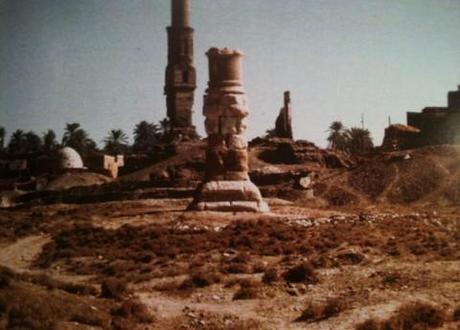 The site of Oxyrhyncus in 1981. From City of the Sharp-Nosed Fish.
The site of Oxyrhyncus in 1981. From City of the Sharp-Nosed Fish.
A while ago I reported the problem of “book lag”, something which everyone whose professional duty it is to read books suffers from (and, I imagine, a lot of people whose duty it isn’t). This means that perfectly interesting and enjoyable books get forgotten about; you get half way through them before, suddenly, you are called upon to review three 900 page novels by the day after yesterday, or similar. Inevitably, the books on my Book Mountain (rapidly becoming a Book Himalayas) turn out to be worth it. One such was Gardner Botsford’s A Life of Privilege, Mostly, which memorably featured a tiger-skinned lady chasing its unsuspecting hero with a whip.
This time it’s a star turn for Peter Parson’s City of the Sharp-Nosed Fish: Greek Lives in Roman Egypt (Weidenfeld & Nicolson, 2007). This charming, entertaining and informative book is not only easy to read, it also delights with its clear-sighted analysis of the papyrus fragments found at the site of the Egyptian city of Oxyrhyncos. Here, in the early twentieth century, the archaeologists Grenfell and Hunt stumbled upon a classicist’s dream – mounds and mounds of intact papyroi.
“I make obeisance on your behalf every day before the Lord God Serapis. From the day you left we miss your turds, wishing to see you.”

Obelix: “These Egyptians are crazy!”
A few of them gave up texts of Homer; there was a lost play of Euripides, Hypsipyle, (which it is thought concerns the cursing of a group of women by Aphrodite for neglecting her shrine; her curse was to give them all extreme body odour. Perhaps that’s why it was lost.) There were songs of Sappho (who features in a Ronald Firbank novel, Vainglory, in which a professor reads out, proudly, the fragment to assembled high society: “Could not (he wagged a finger) Could not, for the fury of her feet!”) and other Greek lyricists. But most were prosaic, and as such add a huge amount to our knowledge and understanding of life at the height of the Roman Empire, just before Christianity.
There are many, shall we say, odoriferous anecdotes, but my favorite is this: Kallirhoe writes to a friend: “I make obeisance on your behalf every day before the Lord God Serapis. From the day you left we miss your turds, wishing to see you.” It seems that those Egyptians had slightly different priorities. Then there’s a “joke billet doux”: “Apion and Epimas say to their very dear Epaphroditos: ‘If you let us bugger you and it’s OK with you, we shall stop thrashing you – if you let us bugger you.’ Keep well! Keep well!’” As Obelix might say: “These Egyptians are crazy.”
Spicy and engaging, Peter Parsons makes a knowing Hermes in this, his guide to a world that we can build up from the tiniest of particles into a whole, bustling, human universe.

